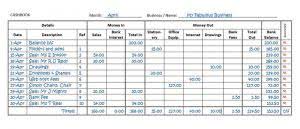
Accounting services often involve complex financial analysis, tax planning, and strategic guidance. Many businesses hire accountants on a consulting or part-time basis, especially when they require specialized expertise. Bookkeepers play a significant role in compliance by meticulously recording financial transactions and maintaining proper documentation. They ensure that the company’s records are in order, making the what is the difference between accounting and bookkeeping tax preparation and audits smoother.

Financial Reporting Standards
- While they oversee the work of bookkeepers and ensure accuracy, their primary focus is on interpreting, classifying, analyzing, and summarizing financial data.
- Accountants use bookkeeping records to assess big-picture finances and make smart business decisions.
- Catch-up bookkeeping and bookkeeping clean up are often used interchangeably, but both involve fixing inconsistencies and filling in missing financial data.
- They may also pursue certifications to demonstrate they have the expertise required to serve their clients.
- That’s why it’s so important to understand the nuances between bookkeeping and accounting.
- Investing in both a bookkeeper and an accountant on your team ultimately sets up your business for the most success while keeping you free to focus on what you’re truly passionate about.
- Businesses of all sizes need to keep careful track of income, expenses, and transactions, which includes everything from daily sales and invoices to receipts and payroll.
Keeping your books clean isn’t just a one-time task—it requires ongoing maintenance. Set up automated bookkeeping systems where possible to streamline transaction tracking, reconciliations, and reporting. Next, remove duplicate vendor entries balance sheet and consolidate records to streamline tracking. Match purchase orders to invoices and payments to verify that every recorded expense is accurate. Keeping accounts payable organized ensures you stay on top of vendor payments and avoid late fees.
- The Bureau of Labor Statistics (BLS) expects 4% job growth in this field from 2022 to 2032.
- Automated comparison functions will help you spot trends and anomalies that might otherwise go unnoticed in traditional spreadsheet analysis.
- The decision to hire a bookkeeper or an accountant generally depends on the complexity and volume of your financial transactions, as well as your business needs.
- They use the data recorded by bookkeepers to analyze a company’s financial performance, assess profitability, manage costs, and offer recommendations for improving the bottom line.
- Following up consistently on overdue invoices helps prevent cash flow problems.
- Both your bookkeeper and accountant can be trusted, key advisors for your business—just in slightly different capacities.
Do I Need Accounting For My Service Business?
The higher earnings for accountants are largely due to their educational qualifications and professional certifications. The salary range for bookkeepers is between $32,460 and $68,860, with the median salary being approximately $47,440. Bookkeeping positions are common in small and medium-sized businesses, nonprofit organizations, and healthcare providers. These roles provide stable career paths with opportunities for growth and specialization. Accounting is a high-level process that uses financial data compiled by a bookkeeper or business owner to produce financial models. Maintaining a general ledger is one of the main components of bookkeeping.

Understanding the Difference Between Accrual Accounting vs Cash Accounting

Working with a bookkeeper can also help Bookkeeping for Painters ensure your books stay clean and up to date so you’re always ready when tax season rolls around. Regardless of the type of bookkeeping a company chooses, recording the day-to-day business financial transactions is an integral part of accounting. Below, we’ll take a closer look at bookkeeping vs accounting, their key differences, and how working with bookkeepers and accounts can benefit your small business.

- While bookkeepers manage the records, accountants interpret the information to support decision-making and long-term financial strategy.
- While there are certain similarities and overlaps between the two, there are distinctions that set these two roles apart.
- Bookkeeping and accounting are essential to any business’s financial management, but they have distinct roles that contribute uniquely to the business’s financial ecosystem.
- Training relevant team members on updated bookkeeping procedures ensures consistency and prevents future errors.
- The best practice for performing the planned vs. real analysis is to use project management software with strong financial features like automated data processing and comparison.
- The accounting process is more subjective than bookkeeping, which is largely transactional.
Additionally, it shows a willingness to learn new methods and techniques to provide a better service. The Generally Accepted Accounting Principles are standards of accounting developed by the Financial Accounting Foundation’s standard-setting board. They are often used to help set standards for financial reporting, and to allow for ease of assessment when it comes to someone, such as an investor or lender, offering resources to a given company.
Financial analysis and reporting
While bookkeepers don’t need a special license or certifications, bookkeeping accreditation and licensing are available. A bookkeeper with professional credentials shows a commitment to the trade. If you own a small businesses, you know the unique set of challenges and opportunities you face. When your business incurs electricity expenses, you debit the electricity expense account and credit cash or bank account.

